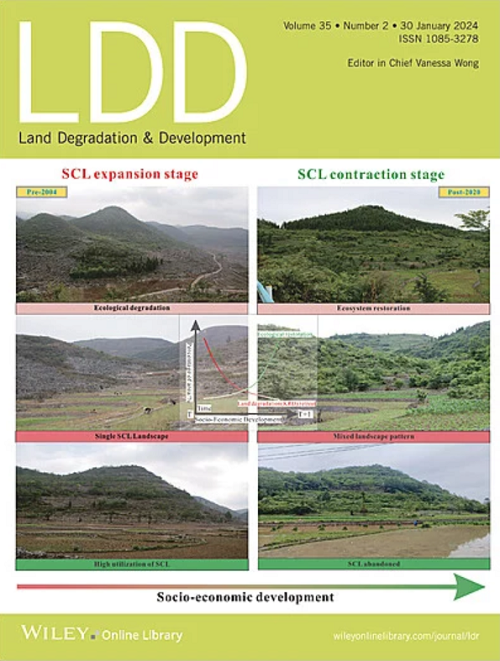Understanding the Grain Production Growth Pathways Transition and Its Implications for Sustainable Grain Production in China
IF 3.6
2区 农林科学
Q2 ENVIRONMENTAL SCIENCES
引用次数: 0
Abstract
The grain production growth pathways transition can achieve the dual strategic objectives of increasing grain production and ensuring ecological security by adjusting the input structure of production factors. However, the current understanding of the transition patterns and driving mechanisms of grain production growth pathways remains inadequate, posing challenges to sustainable grain production. To address this research gap, this study establishes a theoretical analysis framework, proposes methods for identifying and partitioning, and uses panel data to reveal the patterns and driving mechanisms of this transition. The main findings indicate that induced production substitution directly causes the shift in grain production growth pathways from being driven by improvements in grain land productivity to improvements in grain labor productivity. This transition process shows significant differences among grain crop types and regional spatial heterogeneity. The primary contribution of this study is its comprehensive understanding of the driving mechanisms behind grain production growth pathways transition from the perspective of the evolution of production factors. This includes the economic-social, socio-institutional, and environmental-site dimensions of drivers, which influence the induced substitution process of grain production factors and thereby drive the grain production growth pathways transition. We recommend formulating spatial planting plans based on the transition stages and implementing differentiated production targets and subsidy policies for various crops and regions. These findings and recommendations are valuable for ensuring grain security and promoting sustainable production.中国粮食生产增长路径转型及其对可持续粮食生产的启示
粮食生产增长路径转型可以通过调整生产要素投入结构,实现粮食增产和保障生态安全的双重战略目标。然而,目前对粮食生产增长路径转换模式和驱动机制的认识仍不充分,这对粮食可持续生产构成了挑战。为了弥补这一研究缺口,本研究建立了理论分析框架,提出了识别和划分方法,并利用面板数据揭示了这一转变的模式和驱动机制。主要研究结果表明,诱导生产替代直接导致粮食生产增长路径由以粮食土地生产率提高为驱动向以粮食劳动生产率提高为驱动转变。这一过渡过程在粮食作物类型和区域空间异质性上存在显著差异。本研究的主要贡献在于从生产要素演化的角度全面理解了粮食生产增长路径转变的驱动机制。这包括驱动因素的经济-社会、社会-制度和环境-场所维度,它们影响粮食生产要素的诱导替代过程,从而推动粮食生产增长路径的转变。建议根据过渡阶段制定空间种植规划,对不同作物和地区实施差异化的生产目标和补贴政策。这些发现和建议对确保粮食安全和促进可持续生产具有重要价值。
本文章由计算机程序翻译,如有差异,请以英文原文为准。
求助全文
约1分钟内获得全文
求助全文
来源期刊

Land Degradation & Development
农林科学-环境科学
CiteScore
7.70
自引率
8.50%
发文量
379
审稿时长
5.5 months
期刊介绍:
Land Degradation & Development is an international journal which seeks to promote rational study of the recognition, monitoring, control and rehabilitation of degradation in terrestrial environments. The journal focuses on:
- what land degradation is;
- what causes land degradation;
- the impacts of land degradation
- the scale of land degradation;
- the history, current status or future trends of land degradation;
- avoidance, mitigation and control of land degradation;
- remedial actions to rehabilitate or restore degraded land;
- sustainable land management.
 求助内容:
求助内容: 应助结果提醒方式:
应助结果提醒方式:


